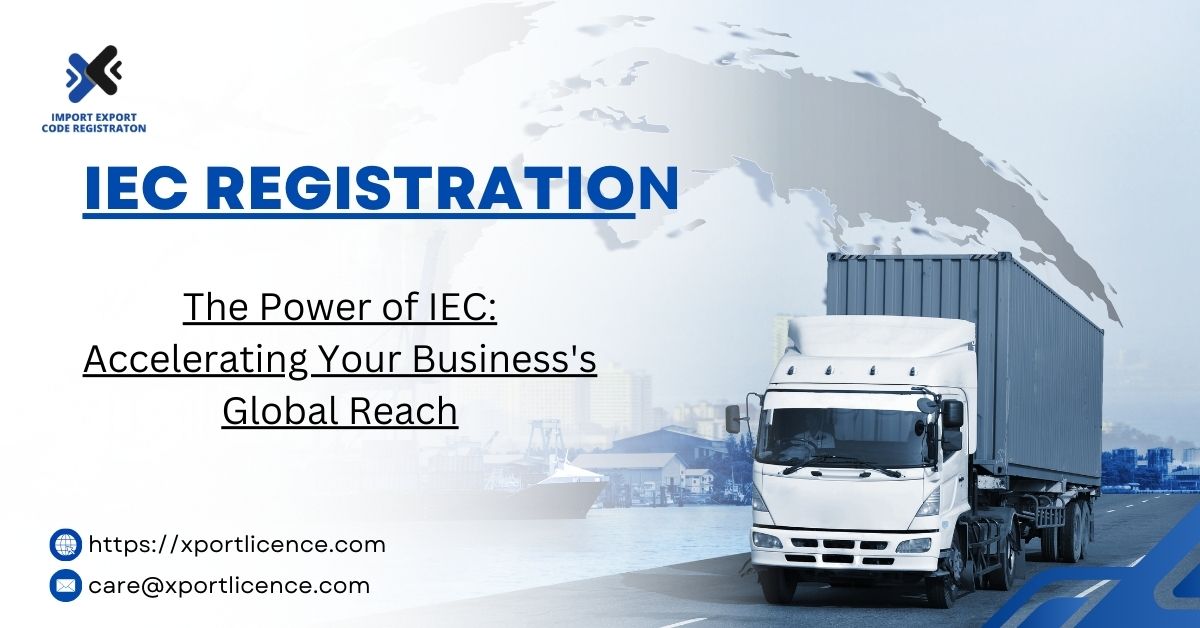Introduction
In the rapidly evolving world of international commerce, tapping into global markets is not just an ambition but a necessity for Indian businesses seeking growth and diversification. Whether you’re an established enterprise or a rising entrepreneur, acquiring an Import Export Code (IEC) is your gateway to participating in cross-border trade. This blog explores the transformative power of IEC Registration and how it can accelerate your business’s global reach.
What is IEC?
IEC stands for Import Export Code, a 10-digit unique identification number issued by the Directorate General of Foreign Trade (DGFT), Ministry of Commerce and Industry, Government of India. It is a mandatory requirement for businesses or individuals who want to export or import goods and services from India. Unlike many government licenses, the IEC is a one-time registration and remains valid for the lifetime of your business. There is no need for renewal, and it serves as a fundamental legal document for international trade.
Why IEC is a Game-Changer for Indian Businesses
1. Legitimizes Your International Business
With IEC, your business is legally permitted to engage in global trade. This official recognition adds credibility and trustworthiness to your brand in the eyes of foreign clients and partners.
2. Smooth Customs Clearance
Customs authorities require IEC to process shipments. Without it, importing or exporting goods is practically impossible. With an IEC, you can avoid unnecessary delays and ensure the smooth movement of goods across borders.
3. Access to Global Markets
IEC allows you to expand your reach beyond domestic boundaries. Whether it’s sourcing raw materials at competitive prices or targeting foreign customers, an IEC helps you operate freely in the international arena.
4. Enables Foreign Transactions
Financial institutions require IEC for processing international payments. If you want to receive payments from foreign clients or pay international vendors, IEC is essential.
5. Eligibility for Export Benefits
Once registered, your business becomes eligible for numerous government schemes and incentives like MEIS (Merchandise Exports from India Scheme), SEIS (Service Exports from India Scheme), and duty drawback benefits.
Who Can Apply for IEC?
The beauty of IEC lies in its accessibility. It is not limited to large corporations. Anyone involved in international trade can apply, including:
- Proprietorships
- Partnership firms
- LLPs and private limited companies
- Trusts, NGOs, and societies (in certain cases)
- Even individual freelancers and e-commerce sellers
Step-by-Step IEC Registration Process
The DGFT has made the process entirely digital and user-friendly. Here’s how to obtain your Here’s a simplified and streamlined version of the IEC registration process written differently:
1. Access the IEC Portal: Start by visiting the official DGFT (Directorate General of Foreign Trade) portal for IEC registration using any web browser.
2. Complete the Online Form: Fill out the digital application form with your business details such as name, entity type, PAN number, and contact information. Accuracy is key here to avoid delays.
3. Review and Submit: Double-check all entered information for correctness, then submit your application online.
4. Make the Payment: Proceed to pay the registration fee securely through online methods like net banking, credit/debit card, or UPI.
5. Verify with OTP: You’ll receive a One-Time Password on your registered mobile number or email. Enter it to confirm your identity.
6. Wait for Approval: The authorities will then review your application and verify your documents.
7. Receive Your IEC Code: Once everything is in order, your Import Export Code (IEC) will be generated and sent to your registered email, usually within 1 to 2 working days.
Strategic Benefits of IEC in Global Trade
1. Business Expansion
Entering new markets becomes easier when you have IEC. You can start exporting your products or importing raw materials to enhance your production.
2. Increased Revenue Streams
Global trade allows you to tap into demand from international buyers, often leading to higher margins and better prices.
3. Competitive Advantage
Sourcing materials globally or offering unique products to foreign markets can give you an edge over competitors operating only in domestic markets.
4. Improved Brand Visibility
International presence boosts your brand recognition and positions your business as a global player, increasing trust and appeal among customers and investors.
Digital Businesses and IEC
The rise of e-commerce and digital services has made IEC even more relevant. Online sellers on platforms like Amazon, Etsy, or Shopify, as well as service providers offering freelance or IT-based solutions to international clients, require an IEC to operate legally and receive payments.
Common Mistakes to Avoid
- Incorrect Document Submission: Ensure that all documents are correctly scanned, signed, and legible.
- Mismatch in Details: Your business name, address, and PAN number must match across all documents.
- Ignoring Updates: Any changes in business structure or address must be updated with DGFT to avoid issues later.
Suggested read: Secrets to Profitable Import-Export Trading
Conclusion
The Import Export Code (IEC) is more than just a compliance formality—it's a strategic tool that empowers your business to thrive globally. From seamless customs clearance to access to government incentives and international payment systems, the advantages of IEC are vast. By mastering the IEC process and understanding its potential, Indian businesses can leap beyond geographical boundaries and build a sustainable international presence.





Comments